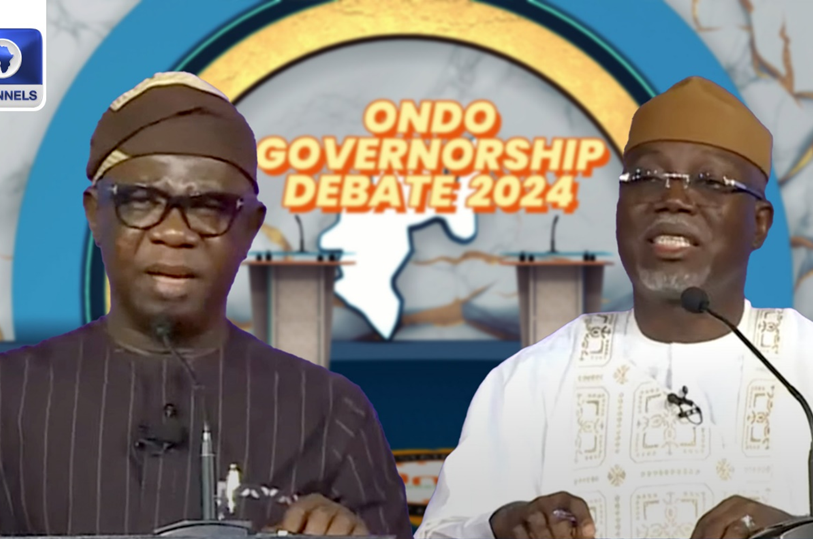Image of PDP candidate, Agboola Ajayi and APC candidate, Lucky Aiyedatiwa during the governorship debate organised by Channels TV ahead of Ondo State November 16 governorship election. Source: Channels TV
Claim
The PDP candidate for the Ondo governorship election, Agboola Ajayi, claims that the State’s incumbent Governor and APC candidate, Lucky Aiyedatiwa, receives ₦1.2 billion monthly as security votes.
Full Text
The Ondo State governorship election is scheduled for November 16, 2024, drawing high anticipation as candidates make their cases to the electorate.
The assumed leading contenders include the incumbent governor, Lucky Aiyedatiwa of the All Progressive Congress (APC) and Agboola Ajayi of the People’s Democratic Party (PDP), who previously served as Deputy Governor during the first term of the late Oluwarotimi Akeredolu’s administration.
In the build-up to election day, a governorship debate, organised by Channels Television, was held in Akure for candidates. During the debate, Ajayi questioned the governor’s management of security resources.
Ajayi claimed that despite the state’s ongoing security concerns, Aiyedatiwa receives ₦1.2 billion as security votes. He argued further that the substantial amount of money has not translated into an effective security strategy for the state.
Ajayi said: “Farmers can no longer go to the farm, People are being killed, and nobody can travel freely. We should not play politics with security.
“Who wants to come and invest here to be killed? All these are happening when my brother (Aiyedatiwa) is collecting ₦1.2 billion as security votes and nothing to show for it”.
Aiyedatiwa refuted the claim, calling it a “political lie” and insisting he never withdrew such a large amount for security.
The governor added: “There is nothing like that. I don’t know where he got his figures from.
“I have never even drawn up to ₦1.2bn before. It is not true. It is all political lies.
“Are you the accountant general of the state or commissioner for finance? Are you part of the government?
“You can’t just play politics by coming here (debate) to tell lies to the whole world that somebody is drawing ₦1.2bn as a security vote. That is a lie from the pit of hell.”
When asked to state the amount of money he collects as security votes, Aiyedatiwa declined. He said: “That is a security matter that should not be discussed on this platform”.
The PDP candidate, Ajayi, was asked to state his source about the ₦1.2 billion security votes. He said the information is a public record.
Issues about the debate can also be found here and here. A video of the debate from Channels TV can be accessed here.
Verification
We used keywords to search Google and public documents, but we could not find any official documents that show how security votes are being disbursed to state governors, unlike state allocations from the Federal Account Allocation Committee (FAAC). Keyword search on govspend did not also produce useful data on amounts of money disbursed to governors for security votes.
We retrieved Ondo State 2024 proposed budget, and found that a sum of ₦9.4 billion was allocated for security votes. However, the monthly disbursement of funds for security votes to the governor could not be ascertained.
As noted by PremiumTimes in its report about the governorship debate, “the appropriation act usually does not have any subhead as security votes from which any such information could be gleaned.” This suggests that it is difficult to ascertain how much each state governor in Nigeria gets as a security vote monthly.
Security Votes: Matters Arising
According to DailyTrust, Security votes were introduced in the late 1960s under General Gowon’s military regime to support displaced civilian officials and prominent citizens after the shift from civilian to military rule. Over time, their scope broadened to encompass a wider range of government officials, reflecting constitutional changes and expanding security responsibilities.
Security votes are discretionary funds provided to governors for handling state-specific security issues. These funds are often excluded from public audits or detailed financial records due to their classified nature, leading to debates about potential misuse or lack of accountability.
The amount allocated as security votes varies across states and depends on the governors’ discretion. Security votes allocated to governors vary widely by state and are generally undisclosed publicly, often leading to scrutiny and calls for transparency.
An article by The Cable show that “in 2021, State governors and local government chairmen in the 36 states of the Federation collected over N375 billion from public coffers in the name of security vote, an act not provided for in the Nigerian constitution or any known law in the country.” BusinessDay confirmed that a sum of ₦375 billion was expended as security votes by governors and local government chairmen. It further reported that Ondo State got ₦600 million monthly as security votes, with other states getting varying figures for the same purpose.
A report by Social Action said the amount spent on security in Nigeria in 2021 is higher than the annual appropriations for Ekiti, Osun and Nasarawa combined.
Transparency International in 2018 estimated that security votes added up to over $670 million (₦241.2 billion ) annually. Transparency International added that ‘although officials often spend some of these funds on security, they also channel them into political activities or embezzle them outright”.
Expenditure on security votes has been described as a channel for corruption. Social Action argues that Governors and local government chairmen routinely make large discretionary expenditures from public funds without accountability, as these funds are often handled in cash and remain beyond legislative oversight or independent audits.
Despite accessing substantial resources, many governors fail to significantly improve security in their states, raising concerns about transparency and effectiveness.
According to a former Acting Chairman of the Economic and Financial Crimes Commission (EFCC), Mr Ibrahim Magu, certain state governors may exploit insecurity in their regions to access larger allocations from discretionary funds like security votes. This practice has been linked to systemic corruption, as well as the perpetuation of banditry and terrorism.
Agboola Ajayi’s accusation that Governor Lucky Aiyedatiwa gets 1.2 billion as a security vote monthly highlights ongoing concerns about the transparency of security fund allocation and use in Nigeria.
The position of Governor Aiyedatiwa that security vote details are sensitive and cannot be publicly disclosed underscores the broader issue of the opaque management of security votes in Nigeria, a practice that has faced criticism for its lack of public scrutiny.
An Expert Opinion
We spoke with an Associate Professor of Political Science at Adekunle Ajasin University, Akungba-Akoko, Dr Bayo Fasuwon. According to him, “technically, anything that has to do with Security is often kept secret. Secrecy is based on the need to protect machinery, personnel, area of disbursement as well as strategy of warfare”.
Dr Fasuwon, however, noted that there had been an arbitrary increase in the amount used as security votes over the years, describing it as “an outlet for legalised corruption”.
Furthermore, he noted that Agboola Ajayi had been in government and may be exposing corruption in government, insinuating that his words may not be outrightly discarded.
The political scientist recommended that there should be post-use scrutiny of the security votes allocated to governors and others who draw funds for security votes.
Conclusion
Given the limited information about security vote expenditure in Ondo State and Nigeria in general, it cannot be proven that Governor Lucky Aiyedatiwa of Ondo State gets ₦1.2 billion monthly as security vote, as there are no available records or information to prove the claim.





